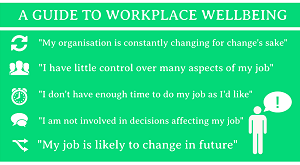March 16, 2015
Managing change plays key role in factors that affect employee wellbeing
 Anyone who has sat on a stationary train waiting to find out just why they’ve stopped moving, will know the twin frustrations of a lack of communication and lack of control. The same goes for those at work who feel they’ve little control over what happens to them and worse still that their employer is neglecting to keep them properly informed of any changes. Data compiled from workplace wellness organisation Good Day at Work, founded by Organisational Psychologist Professor Sir Cary Cooper now includes a handy infographic which illustrates the five biggest factors affecting employee wellbeing. These are, organisations that change for change’s sake; people having little control over their job; not having enough time to do their job; not being involved in the decisions that affect their job and knowing their job is going to change but not how.
Anyone who has sat on a stationary train waiting to find out just why they’ve stopped moving, will know the twin frustrations of a lack of communication and lack of control. The same goes for those at work who feel they’ve little control over what happens to them and worse still that their employer is neglecting to keep them properly informed of any changes. Data compiled from workplace wellness organisation Good Day at Work, founded by Organisational Psychologist Professor Sir Cary Cooper now includes a handy infographic which illustrates the five biggest factors affecting employee wellbeing. These are, organisations that change for change’s sake; people having little control over their job; not having enough time to do their job; not being involved in the decisions that affect their job and knowing their job is going to change but not how.
The data gathered using over 60,000 answers from Good Day at Work’s i-resilience questionnaire describes in more detail the five most prevalent factors that are affecting employee wellbeing in the UK and what people need to do to address the problem:
“My organisation is constantly changing for changes sake”
Change pervades all aspects of life and, although periods of change can seem unnecessary at times, it’s important for an organisation to shake things up even when they don’t necessarily need to. What matters here is employee attitudes to change and how that change is managed; not change itself! Employees need to be prepared and equipped to deal with periods of transition. In fact, continually tweaking your method of operation is far more preferable than waiting until it rains to fix the roof.
“I have little control over many aspects of my job”
Control provides a sense of autonomy and the chance to influence what, and how, work is done. It’s crucial to encourage a sense of purpose in individuals – but it’s also crucial that individuals want to take control of their job role and take advantages of opportunities, such as appraisals, to discuss goals and targets in-depth. If you want more control, ask for it!
“I don’t have enough time to do my job as I’d like”
This boils down to resourcing and communication. If you don’t have enough time to do your job as you’d like, let your manager know and lay out your thoughts on how you would like to conduct your job in an ideal world. Talking these issues through is the easiest way to make managers aware of the resources they are lacking.
“I am not involved in the decisions affecting my job”
Again, a sense of control is vital for our wellbeing inside and outside of work. If you feel like you are not involved in the decisions affecting your job then take advantage of your social support network and find out why you are not involved in these decisions.
“My job is likely to change in future”
This is all about being prepared and resilient enough to navigate change. Modern day work hinges on being adaptable and ready to handle these changes, but it is down to the management to keep staff informed and equipped to do so – particularly when it concerns their work role in particular.
















